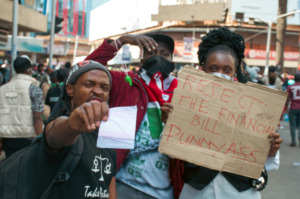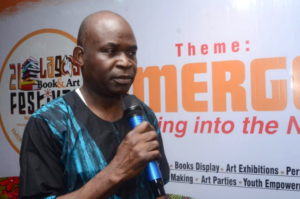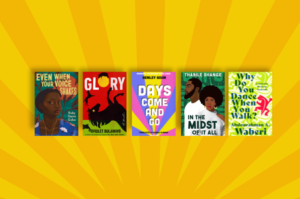
1
“Language…has a dual character: it is both a means of communication and a carrier of culture,” writes Ngũgĩ wa Thiong’o in contemplating why language is powerful. The power of a language does not only lie in speaking it but also in using it to create and transmit culture through time.
Some of Ngũgĩ’s clearest utterances about language are in Decolonizing the Mind. One of his major contributions to the discussion of African languages is his idea that language is a systemic issue. Language is as powerful as the institutions it animates and which animates it in turn. It is one thing to speak Yoruba at home and quite a different thing to teach in a school system where Yoruba is the primary language of instruction, where physics textbooks are in Yoruba, and where a library containing 2 million documents and books are all in Yoruba. Speaking Yoruba is great, but establishing Yoruba within institutional spaces where it grounds the production of knowledge is even better.
Literature is one such institution. Today, African language literature dwells at the margins of a literary culture and industry that seems immovably centered on European languages. To be clear, this essay is not about critiquing the use of European languages in African literature, in part, because I find those debates and controversies tiresome. They are ideologically-driven and end up reducing complex cultural and historical forces to questions of identity and authenticity: Does literature written in European languages count as African literature? Then you have those on the other extreme who claim that English is an African language. I want to move on from these ways of formulating the problem. I want to set aside ideology for a second so that I can see clearly what the real stakes are. After all, we’ve had these quarrels for decades and yet nothing has changed. The fact is that no matter where we stand on the so-called language controversy, we can agree that African language literatures urgently need to be centered in African literary culture. In other words, we can all write in whatever language we please and still invest in African language literature. Those are not two mutually exclusive things. The problem was never that Achebe wrote in English and saw all kinds of value in doing so. The problem is that Achebe and many in his generation did not do enough to include African language literatures in the culture, in the industry, in the market. Take the African novel for instance. In The Rise of the African Novel, Mukoma wa Ngũgĩ suggests that the decision to keep African language novels out was strategic. In an attempt to consolidate the African novel into a global form, competing forms of the novel were excluded so that the realist novel in English came to be the dominant form of African literary expression. The more global the African novel became, the less it seemed worth it cultivating the local reading cultures that served African language novels. It turns out that in the 1950s and 60s when African literature written in European languages were taking off, African language literature was left behind. The question is how do we reverse this unfortunate history?
In some countries, African language literature is older than literature in European languages. Thomas Mofolo was writing at the turn of the 20th century. Beginning in 1906, his novels were initially published as serials in Leselinyana, a local newspaper published in the Sesotho language. A year ago while was drafting a chapter in my book, I read English translations of letters to the editor sent in response to Mofolo’s controversial book Chaka. These letters gave me a glimpse into Sesotho reading culture at the time, how vibrant it was, how engaged these readers were. Similar trends were taking place in Lagos with Yoruba journals, in Nairobi, and other places. Today, with the exception of Hausa language, Swahili, and a few others, African language literature has become curiosities you encounter in special collections archives in university libraries. Even with Swahili literature, we could do so much more to build it into a richer, more diverse cultural ecosystem. I love the work that the Mabati Cornell Kiswahili Prize, Jalada, the African Books Collective, Munyori Literary Journal, Afrolit San Frontiere, Imbiza Journal and others are doing to build the culture, but more is needed.
2
One area where African language literatures lack every kind of institutional influence is in translation. When we talk about the problems facing African language literary culture, we tend to focus on texts originally written in these languages, not on translations, which present a far more dismal picture. One of the greatest scandals of modern literature is that an Igbo translation of Things Fall Apart has not been published. Word on the streets says that there are translations out there. They just haven’t been published. In any case, an Igbo translation of Things Fall Apart should not only exist but should also have considerable impact on the culture around the book. But it’s not just Things Fall Apart. What of Great Expectations? What of The Kamasutra? What of Isaac Newton? Why isn’t there a Swahili translation of Game of Thrones, a Yoruba translation of Beloved, a Shona translation of Sex and the City? African languages are translated into European languages, but never the other way round, except in cases such as the bible with its legacies of colonialism. In Nations Negres et Culture, Cheikh Antar Diop translates a short excerpt of Einstein’s Theory of Relativity into Wolof. He wanted to prove that African languages could handle the most abstract philosophical thought. Of course they can! That shouldn’t be the point of contention. The real value of Diop’s experiment is that it shows us the cost of depriving African languages of the power of translation. When language B is translated into language A, the translation benefits language A because the translated language enriches the translating language. For example, imagine all the new words and images that would have to be invented to translate Einstein’s Theory of Relativity into Igbo. Igbo stands to gain far more from the translation than English. Ngũgĩ unashamedly calls this uneven relationship a kind of “preying.” “How,” he asks:
“can we enrich our languages? How can we “prey,” on the rich humanist and democratic heritage in the struggles of other peoples in other times and other places to enrich our own? Why not, have Balzac, Tolstoy, Sholokov, Brecht, Lu Hsun, Pablo Neruda, H. C. Anderson, Kim Chi. Ha, Marx, Lenin, Albert Einstein, Galileo, Aeschylus, Aristotle and Plato in African languages?”
I prefer to think of translation less as preying (I bristle at the violent imagery) and more as an openness to the riches offered by others. Every language is a storehouse of cultural, metaphysical, and linguistic treasures. Translating texts in other languages into African languages is how we partake of the global exchange of these treasures.
3
It is common to pose the question of African language literature as a controversy, a line drawn between Achebe and his supporters on the one hand, Ngũgĩ and his militants on the other. The arguments have been updated over the decades, but we still come back to that founding debate. It’s time to move on from the controversy so that we can take on the task. Time is of the essence. African language literature suffers from infrastructural problems resulting from over a century-long neglect that needs to be urgently reversed.
Stakeholders who claim that there is no market for African language literatures are missing the importance of capacity building. Imagine how things would have been different if the last 100 years had been spent building on the momentum set off by Mofolo’s generation: cultivating markets, setting up literary prizes, training writers and translators, expanding literacy, advocating for government policies, and networking with global institutions. As someone who runs a literary platform, I’ve been thinking a lot about these issues. What part can Brittle Paper play in making space for African language literature? This is a question that everyone—publishers, critics, authors (regardless of what language you write in) should be asking.









Ainehi Edoro September 03, 2021 10:56
Thanks Dr. Mambambo for sharing the link. We'll definitely check it out and consider featuring it on the site.